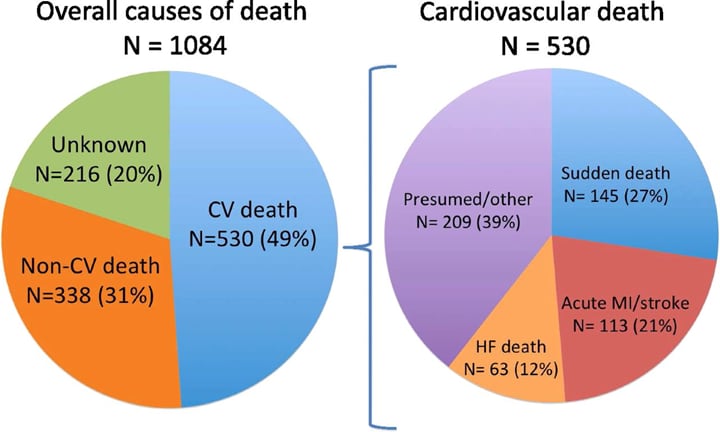Heart Disease in the Diabetic Patient:
It’s Not Just About the Blood Sugars
Written by Keith Miller, MD
November is Diabetes Awareness Month and as you know diabetes is a major contributor to many other conditions including cardiovascular disease. But did you know that as many as 50-60% of all diabetics will die a cardiovascular (CV) death?
Principles of Prevention of Cardiovascular Disease Complications in Patients with Diabetes:
- Therapeutic lifestyle interventions
- Blood pressure lowering medication
- Lipid lowering therapy (principally with statins)
- ACE inhibitors for high risk patients independent of blood pressure
- Daily aspirin
- What about medications for glucose control?
Diabetes Increases the Risk of Atherosclerotic Cardiovascular Disease (ASCVD)
Patients with diabetes are at increased risk of coronary heart disease, ischemic stroke, PAD and heart failure. Atherosclerotic cardiovascular disease remains the principle cause of death and disability among patients with diabetes.

Data from the Trial Evaluating Cardiovascular Outcomes with Sitaglipitin (TECOS) Trial Diabetes Care 2017 Dec; 40(12):1763
Mechanisms of Increased ASCVD Risk
Hyperglycemia
- Greater risk of ASCVD with increasing “dysglycemia”
- 11-16% increase in cardiovascular events for every 1% increase in HbA1C
Hyperinsulinemia
- Impaired insulin signaling promotes atherosclerosis
Dyslipidemia of Diabetes
- LDL cholesterol particles are more atherogenic in diabetes
- High triglycerides and low HDL
Inflammation
- Increased inflammatory markers in diabetics predict higher rates of CV events
- Endothelial dysfunction
- Hypercoagulability
Managing Cardiovascular Risk in the Diabetic Patient
Until recently, T2D therapies other than metformin had little obvious favorable effect on CV outcomes. Most cardiologists have focused their efforts on managing traditional risk factors (hypertension, hyperlipidemia and overweight/obesity). Some providers occasionally stop drugs that may cause HF (e.g., glitazones). The results from recent FDA-mandated cardiovascular outcomes trials (CVOTs) have shown not only CV safety, but also reduced CV and all-cause mortality, and hospitalization for heart failure.
These trials include patients who are common in cardiologists’ practices. The magnitude of beneficial results compares favorably with the landmark cardiology trials that have shaped our current standards of care in primary and secondary prevention of CV events (statin trials, BP lowering trials, etc.).
Diabetes Drugs: CVD or Mortality Risk Benefits
Biguanides (metformin)
- Few randomized, but many observational studies available
- Reduces risk of MI by 39%, mortality by 36% (UKPDS)
- First choice in T2DM patients with and without atherosclerotic vascular disease
Sulfonylureas [glimepiride (Amaryl); glyburide (DiaBeta); glipizide (Glucotrol)]
- “Black box” CV warning from the FDA regarding heightened risk for CV events
- Reduction of microvascular complications
Thiazolidinediones (TZDs) [rosiglitazone (Avandia); pioglitazone (Actos)]
- Heightened HF risk, as well as weight gain and potential fracture risk
Dipeptidyl peptidase-4 inhibitors [sitaglipitin (Januvia); saxagliptin (Onglyza)]
- Neutral CVOT results so far; questions about incident HF risk
Insulin
- No demonstrated CV benefit
Summary of Key Findings of the 4 Positive CVOTs in T2DM

CV Disease Prevention in Diabetics: Opportunity Knocks
Diabetics with cardiovascular disease have a very high risk of death, heart failure, MI and stroke. The risk is imminent and exists even with excellent care of blood pressure and lipids. Risk of heart failure and CV death is especially pressing. As stated before, 50-60% of all diabetics die from a CV death.
Recent CV outcomes trials have shown powerful, new information about tools to prevent CV events. After decades of frustrated efforts to reduce the risk of “macrovascular events” (i.e. heart attack, stroke and CV death) with glucose lowering therapies like insulin and sulfonylureas, newer drug classes have shown compelling benefits in terms of reduced risk of CV events. These include primarily the SGLT-2 inhibitors and GLP-1 agonists. Especially in the case of the SGLT-2 inhibitors, benefits are observed very early in the course of therapy, even within the first few weeks.
SGLT2 inhibitors - such as Empagliflozin (Jardiance) and Canagliflozin (Invokana) - effects on heart failure and CV death are very rapid. While GLP-1 agonists – such as Liraglutide (Victoza) and Semaglutide (Ozempic) – are a little slower.
As studies continue and data is collected, advancements will continue to be made in this area.
Preventative Care: A Partnership
Bryan Heart is dedicated to partnering with you as the primary care provider, especially in the area of preventative care for patients. We have broadened our service offerings and now offer a more encompassing prevention clinic for patients with cardiometabolic, lipid and cardiovascular disease.
For more information or to refer a patient to the Bryan Heart Prevention Clinic, please visit the Bryan Heart Prevention Clinic webpage or call 402-483-3301.

